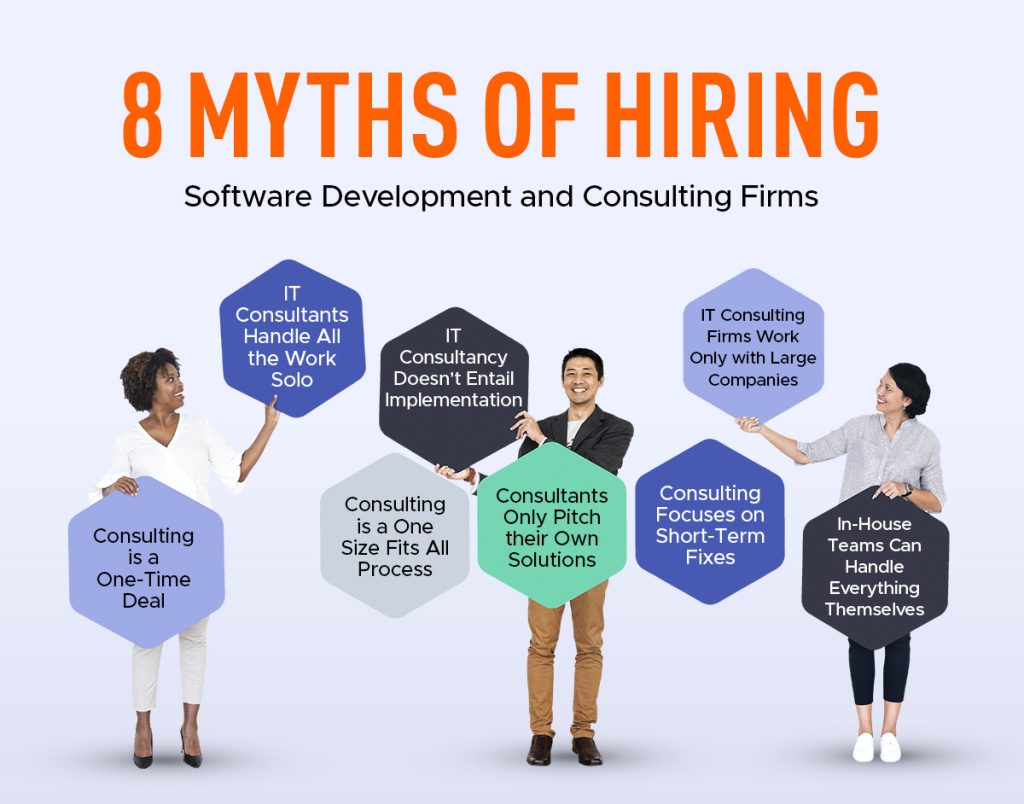8 Myths of Hiring Software Development and Consulting Firms

Unless you’re new to outsourcing software development, you probably noticed that more software development companies now offer consulting services as part of their portfolio.
The numbers further prove this. Around 61% of software development firms now also offer IT or digital consulting services. Statista also revealed that companies add consultancy to their offerings to increase client retention by up to 30%.
This shift was necessary considering how organizations increasingly seek strategic technology partners rather than just code vendors. Plus, many require ongoing optimization of their architecture, UX, cloud costs, and AI readiness.
In spite of this, Deloitte reports that only 48% of organizations prefer working with one integrated partner for both software development and consulting. One reason for this is the numerous misconceptions decision makers have.
If you’re not part of the 48% availing these services, chances are you’ve heard your fair share of myths. So, to ensure they don’t make you miss out on the best thing for your organization, let’s reveal their truths.
Software Development Consulting Misconceptions and their Truths
The sad truth is that many still misunderstand what software development consulting really means. Some see it as an unnecessary cost; others confuse it with simple project management or coding help.
But in reality, consulting goes far beyond technical advice. A fact the following eight truths of popular myths will reveal to you.

1) Consultants Handle All the Work Solo
Contrary to popular belief, software consultants rarely work in isolation. After all, their primary goal is to collaborate and enable your workforce, not replace its members.
Consultants act as strategic enablers who assess your technology ecosystem, define the right processes, and guide your in-house experts through best practices. They ensure alignment between business goals and technical capabilities while transferring skills and frameworks that empower teams long after the engagement ends.
Instead of taking over, consultants bring cross-industry expertise, helping your teams adopt agile methodologies, improve code quality, or integrate emerging technologies like AI and cloud-native systems.
So, your goal should be to ensure that your software development and consulting partner and internal teams operate as one. Only then can you achieve effective outcomes.
2) Consulting Software Development is a One-Time Deal
Some believe that software development consultants aim to get the most money out of their clientele.
However, you should know that software development consulting isn’t a single-step transaction; it’s an iterative and ongoing process that evolves as your business grows.
Moreover, IT consulting often spans the entire software lifecycle — from strategy and discovery to implementation, testing, and post-launch optimization. That way, organizations can rest assured of their ability to quickly adapt to changing customer expectations, cybersecurity threats, and emerging technologies such as AI, IoT, or blockchain.
For instance, a company may start with a digital transformation roadmap but later need consulting for data-driven decision-making or automation workflows. In such a case, continuous consulting ensures the software remains relevant, scalable, and aligned with evolving goals.
So, rather than a temp addition, you should view consultants as long-term partners and leverage their insight to stay ahead in innovation and compliance.
3) Software Development Consulting Services Don’t Entail Implementation
Gone are the days when consultants only offered reports and theoretical advice. Modern software development consulting is deeply integrated with execution. In fact, around 82% of consulting firms go beyond strategic guidance to offer implementation support.
The best software development and consulting partners work from planning to production. And if they take pride in being the best IT consulting services for digital transformation, they’ll design system architectures, supervise integrations, and validate solutions in real-world conditions.
That way, they can ensure their recommendations translate into measurable outcomes. This approach minimizes the risk of “strategy drift,” which is when plans fail due to poor handover between advisors and developers. Instead, you get continuity and accountability, ensuring the consulting vision materializes as tangible software.
Implementation-led consulting further helps optimize time-to-market and ROI by aligning technical execution directly with strategic intent. So, you’ll definitely be getting your money’s worth and more.
4) IT Consulting is a One Size Fits All Process
If there’s one thing effective software development and consulting firms know, it’s that every business has its own operational reality.
Organizations adopting customized consulting strategies are likely to experience a higher success rate in achieving project KPIs compared to those following standardized models.
That’s why consultants don’t apply pre-packaged frameworks; they conduct contextual assessments, analyzing industry requirements, existing systems, budgets, and future goals.
For example, the technology roadmap for a fintech startup differs vastly from that of a government enterprise or healthcare institution. Tailored consulting ensures solutions fit your environment.
💡If you’re in the fintech industry, you should know that fintech consulting is becoming a competitive differentiator. Skilled fintech consulting companies enable financial institutions and startups to navigate complex challenges like regulatory compliance, AI-driven automation, cybersecurity, and digital payments modernization. They can further guide you through core system upgrades, API-driven ecosystems, and open banking strategies. All while ensuring innovation doesn’t compromise compliance or security.
Moreover, consultants often use data analytics and digital maturity models to personalize recommendations, aligning them with each client’s stage of transformation. This adaptive approach minimizes risks, optimizes costs, and drives measurable business outcomes.
So, when screening your next partner, ensure their approach is bespoke, iterative, and impact-driven.
5) Consultants Only Pitch their Organizations’ Solutions
Ethical consulting thrives on objectivity and trust, not sales pitches. While some less reputable firms may promote their proprietary products, most leading software development and consulting firms operate as technology-agnostic advisors.
This delivers several benefits, including:
Objective, Unbiased Recommendations
Since they aren’t tied to a specific vendor, technology-agnostic consultants evaluate all available options equally. Their decisions are guided by performance, compatibility, and ROI, not sales incentives.
Therefore, your organization gets to invest in what truly fits rather than what’s being marketed most aggressively.
Cost Efficiency and Flexibility
A vendor-neutral consultant can help you avoid vendor lock-in. This issue occurs when a company becomes dependent on one provider’s technology, making it costly or difficult to switch vendors. And there’s also the risk of limited customization.
Instead, the consultant designs flexible architectures that let you switch providers or integrate new tools easily as your needs evolve.
Holistic Strategy Alignment
Technology-agnostic advisors focus on business outcomes rather than specific technologies. They align your IT roadmap with strategic goals such as scalability, security, and innovation. This, in turn, ensures your business gets solutions that best serve it.
Future-Proof Solutions
As they evaluate emerging technologies across multiple ecosystems, these advisors help build future-ready systems.
They take into consideration interoperability, data portability, and scalability to ensure your solutions remain relevant in fast-changing markets. This is especially critical in industries like fintech, healthcare, and logistics.
Enhanced Innovation
A technology-agnostic software development and consulting partner will encourage experimentation and hybrid adoption.
For instance, they may combine AWS cloud with Azure AI tools or open-source frameworks. That way, they create innovative, high-performing ecosystems that wouldn’t be possible within a single vendor’s limits.
Stronger Negotiation Power
Since your chosen advisor isn’t tied to a vendor, they can help you negotiate better terms and licensing deals. Their market knowledge further ensures you understand fair pricing, and can avoid unnecessary add-ons or vendor-driven dependencies.
In addition to the above, having an impartial stance builds credibility and ensures long-term success. That’s why major firms explicitly position themselves as “partner-neutral” to preserve advisory integrity.
And that’s the right way to get things done. Because consultants act as strategic advisors, not sales representatives. Their goal is to assist businesses in choosing what’s right, not what’s convenient for the vendor.
6) Software Consulting Firms Work Only with Large Companies
Previously, enterprise clients were the primary market for software development and consulting service providers. However, that’s become a thing of the past. Consulting is now highly democratized and accessible to startups and SMBs.
The rise of modular consulting models and remote advisory services has made expert guidance affordable for smaller organizations. Many firms offer scalable consulting packages tailored to limited budgets. And their offerings span from short-term discovery sessions to architecture reviews and MVP strategy consulting.
For instance, a startup can work with a consulting firm to validate its SaaS model before investing in full-scale development.
If you’re a small business owner who’s unsure about how consultants can help you, here are some benefits you can expect.
- Expert Guidance Without Full-Time Costs – Gain access to specialized skills and strategic insights without the expense of hiring permanent experts.
- Smarter Technology Decisions – Consultants help you choose the right tools and software that match your goals and budget, avoiding costly trial and error.
- Faster Growth and Efficiency – With process optimization and digital strategy, consultants streamline operations. Therefore, you can scale faster and compete with larger players.
- Risk Reduction – From cybersecurity to compliance, consultants identify vulnerabilities early and help you mitigate risks before they impact your business.
- Objective Perspective – As external partners, consultants offer unbiased advice to help you make clear, data-driven decisions.
- Customized Solutions – Instead of generic strategies, you get tailored plans designed around your unique needs, industry, and stage of growth.
DPL was able to achieve this and more while offering consulting services to Cyber Ventures, an automobile purchase consulting and buying services provider. With our end-to-end consulting services, we guided the company on generating more traffic while creating scalable websites and a customized CMS.
The result? Cyber Venture attracted the attention of Autobytel in 2010 and was acquired for $15 million. You can learn more about this engagement from the video below.
7) Consulting Focuses on Short-Term Fixes
Rather than quick fixes, quality software development and consulting firms focus on building long-term resilience and innovation capacity.
While consultants may address immediate bottlenecks, their real value lies in future-proofing systems and processes. They help businesses design scalable architectures, integrate automation, and develop governance frameworks that support continuous evolution.
For example, upgrading legacy systems or modernizing cloud infrastructure may solve today’s issues while preventing future technical debt.
Effective consulting focuses on building adaptive, data-driven ecosystems that evolve with changing market dynamics. With long-term thinking embedded into everything they do, the best consultants measure success by how sustainable, secure, and competitive your organization becomes over time.
💡Discuss introducing Agile/DevOps practices into your organization; these can be a game-changer for achieving operational efficiency. These methodologies break down silos between development and operations, shorten delivery cycles, and foster continuous improvement.
All of the above translate to faster time-to-market and higher product quality.
However, successful implementation demands a strategic mindset shift. This is where software consulting services add real value. Skilled consultants help you assess your workflows, build cross-functional teams, and design a transformation roadmap based on your business goals.
According to McKinsey (2024), organizations that effectively adopt Agile and DevOps with consulting support see up to 60% faster release times and 30% lower operational costs within the first year.
8) In-House Teams Can Handle both Software Development and Consultancy
While in-house teams are indispensable for day-to-day development, they often lack the external perspective, market insight, and cross-domain expertise that specialized consultants bring.
These further lead to limited strategic foresight or biased internal decision-making, causing your digital transformation efforts fail.
Experienced software development and consulting firms, on the other hand, provide objective analysis and industry benchmarks drawn from diverse client experiences. They introduce proven frameworks for agile adoption, architecture optimization, or cloud migration, saving you months of trial and error.
Moreover, consultants often act as neutral facilitators between business and technical units, ensuring alignment on goals and KPIs.
Just to be clear though. This in no way diminishes the value of in-house teams; rather, it enhances it. The most successful organizations combine both, benefiting from internal strengths with external strategic input.
This hybrid model balances deep institutional knowledge with broad industry expertise, resulting in faster innovation and stronger project outcomes.
Did You Know DPL is a Leading Software Development Consulting Company?
Whether you need cloud DevOps consulting or guidance with the direction of your startup, we’re here to help. We have the experience, expertise, and high level of commitment you need to succeed.
Let us know how we can help in the form below. Rest assured your next IT project is in the best of hands.





